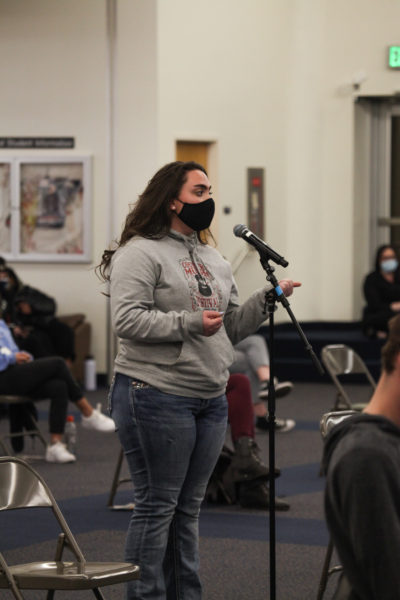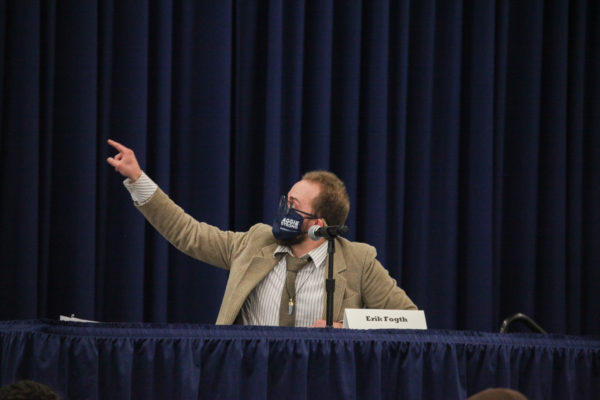USU student body presidential debate 2021
Debate Recap:
During Wednesday’s debate, candidates for Utah State University’s student body president addressed issues of exclusivity on campus, student fees and a disconnect between USU students and USU student government.
The debate was moderated by USUSA administrative assistant Dexton Lake.
“These questions will be hard, and they are meant to be so,” Lake said. “These are actively some of the hardest questions we’ve asked in a debate.”
The current candidates for student body president are Lucas Stevens and Erik Fogth.
Segment 1: Candidate Platforms
During the first segment, issues were raised about weak points in the candidates’ platforms.
Addressing Fogth, Lake asked about his platform to increase “inclusion” and involvement opportunities for students. Lake pointed out that this platform closely mirrors proposals from previous candidates.
“There’s nothing wrong with taking a platform from an old president,” Fogth said. “It doesn’t mean my whole platform is from old presidents, but I think there’s nothing wrong with building on instead of re-inventing the wheel.”
Fogth said he wanted to create a program called “Aggie mentors,” a program where students already involved with USUSA could mentor others and give them more opportunities. He also said he wanted to create an Aggie Heroes scholarship initiative.
Additionally, Fogth called out what he believes is the “elitist culture of the third floor,” or the exclusivity of involvement opportunities for students not already apart of USUSA.
Lake questioned Stevens about his platform, which states that Stevens will advocate on behalf of all students while building on his experience as the current executive vice president. Yet, Stevens also said that, while his door is always open, he is not an event planner, indicating that students had to find him if they wanted anything done.
“Why is it the student’s responsibility to come to you,” Lake asked. “How do you plan to do things differently than you have done this last year?”
Stevens said the president and executive vice president have different roles. He stated that the vice president’s role is meant to be more bureaucratic.
“I would appoint a good PR and marketing director to reach students,” Stevens said. “That’s their job.”
Stevens was also asked what steps he has taken to promote inclusivity this past year.
Stevens said he tried to ensure students-at-large had diverse backgrounds. He also mentioned being involved in making a statement about the death of George Floyd and the Black Lives Matter movement.

Audience Member Directing a Question Towards Candidates
Segment 2: Current Events and Issues
The second segment focused on student fees and the restructuring of student fees.
Lake asked Stevens how he would address any restructuring of fees, and, if put in that position, what fees or student fees he would cut.
“There is a big learning curve with every position when you come in,” Stevens said. “I will not say that I know everything about every fee, but there will be less of a learning curve when it comes to making proposals on possible cuts.”
He also mentioned that fees had remained flat this year, and it was anticipated that they would stay that way for the foreseeable future.
Stevens said he previously suggested looking at the technology fee as a possible cut. During January’s fee board meeting, a $1.60 technology fee decrease was proposed for unused computers.
Fogth indicated that he would like to cut back on athletics’ fees, as only 400 students can attend each game per COVID restrictions.
Lake asked what he would say when the athletics department argued that that was unreasonable, as athletics brings so much money to the university.
Fogth said there would be revenue, since he would suggest that students who want to go be able to purchase a reduced ticket. USU games are currently free to all students because of student fees.
He also said the main issues facing USU, apart from COVID and mental health, are a lack of opportunities, lack of community and lack of retention.
Stevens said his main concerns with the university were academic, financial and safety challenges.
During the segment, Fogth attacked Stevens’s position and said that he had never really accomplished anything as executive vice president.
Stevens responded and said he spent a lot of time in executive meetings this past year, all while advocating for the interests of the students.

Erik Fogth, Presidential Candidate, at USU Presidential Debate
Segment 3: Personal Questions
During the final segment, the candidates were asked how they would address disagreements with President Noelle Cockett and disagreements with constituents.
Fogth said he would respect Cockett, but, if he felt it was something the students really need, he would push forward and find processes to appeal their requests.
Stevens said he would rely on logic and not let things get personal with Cockett.
“It’s really about the students and keeping students in mind,” he said. “I really think that’s Cockett’s intention, and it would be mine too.”
Stevens was asked how he would handle disagreements with fellow officers and students. He said it was important to have more of a social media presence to connect with students, and to utilize student media to help distribute information to students. He then said, after distributing that information, meeting with students would be key. His hope is to follow current student body president Sami Ahmed’s example in doing this.
Fogth said his plan is to create a cabinet for his PR and marketing director. The cabinet would be responsible for getting USU’s biggest “social media influencers” to connect with students.
During the segment, Lake addressed a question about Fogth’s perceived lack of professional conduct. Fogth said he had plenty of experience dealing with professionals, including getting initiatives passed.
“It doesn’t have to be a bureaucracy,” he said. “People don’t have to be some big elusive leader to be a successful leader.”
Lake also asked Stevens why he would be a good president, based solely on his experience, when Ahmed had served for two years without previous USUSA experience.
“I don’t think being the vice president is necessary to be the president,” Stevens said. “But, at the same time, someone who really knows what’s going on and has been in that position is really an asset to students.”
The debate concluded with student questions and closing statements.
*Election polls closed at 8 p.m. Thursday evening. Results will be available 11 a.m. Friday morning.

